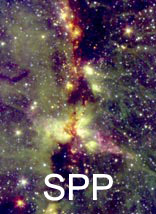| Export Compliance: Proposed International Participation | ||
Navigate this page:
International collaborations for space-based research require compliance with export/import regulations of several federal agencies. The regulations most applicable to the research activities of the Smithsonian Astrophysical Observatory (SAO) concern export/import in the following general categories: Regulated by the U. S. Department of State (International Trade in Arms Regulations [ITAR] 22 CFR 120-130, including the U. S. Munitions List [USML]),
Regulated by the U. S. Department of Commerce (Export Administration Regulations [EAR] 15 CFR 730-799, including the Commerce Control List [CCL]).
The bulk of the exports for a scientific collaboration usually consists of "Technical Data" that is, data concerning regulated hardware or software (e.g. requirements and interface control documents). To comply with export regulations, the transfer of technical data to foreign partners and foreign employees requires either a license or an exemption. GENERAL APPROACH FOR COMPLIANCE WITH U. S. EXPORT REGULATIONSSAO is currently registered with the State Department's Directorate of Defense Trade Controls (DDTC) as a government entity and exporter of items subject to the International Traffic in Arms Regulations (ITAR) (22 CFR Parts 120 - 130). All space activity that is not in the public domain is regulated under the military jurisdiction. We are approved to submit electronic license submissions via D-Trade 2, the portal for electronic licensing. These two employees below have authority as Empowered Officials to access the D-Trade system, digitally sign the applications and stop any shipment they believe is not authorized. Commercial satellite technology may soon be moved back to the Commerce Control List, following the implementation of Export Control Reform. Empowered Officials (EO)
These employees at above are available to assist the research community in evaluating which regulations may impact a contract, determine what type of authorization is required, obtain the proper license, manage the activities under the license and maintain records for the required five years. It is important to anticipate enough time for preparing for the export process and thereby not put SAO at risk by trying to export without proper authorization due to inadequate planning. For commercial items, the SAO is registered with the US Department of Commerce, Bureau of Industry and Security to use their export license portal -- SNAP-R. We use this portal to submit classifications if we want confirmation that a piece of equipment may be exported to a collaborator without a license or use the site to apply for export approval. HOW YOU CAN HELP SAO COMPLYDuring the proposal preparation, submission and contract negotiation stages, SAO policy requires that scientific/technical employees be familiar with current export/import regulations and control lists of items that require an export license. These lists are posted on the Export Compliance website. All employees (PI, PM and DAs) are encouraged to contact the SAO Export Compliance Officer (SAO/ECO) for all export/import compliance issues. If any non-U. S. person disclosures are necessary, including for release of Technical Data, the SAO/ECO will obtain the appropriate license from either the U. S. Department of State or U. S. Department of Commerce and will start a file to identify and account for ITAR- or Commerce-controlled transactions. EXPORT CONTROL CLAUSES IN CONTRACTSContracts issued by NASA, involving international participation, include the FAR Supplement Clause 1852.225-70 Alternate 1. NASA contractors and subcontractors are subject to U. S. export/import control laws and regulations including ITAR and EAR. They are responsible for obtaining the appropriate licenses or other approvals or providing technical assistance to a foreign destination or "foreign person" (as defined in 22 CFR 120.16) if there are no applicable or available exemptions/exceptions to the ITAR/EAR. This means that if the hardware is not controlled but they are assisting in configuring or using it for a controlled activity, then the assistance may require a license. The exemption at 22 CFR 125.4(b)(3) of the ITAR provides that a contractor may export technical data without a license if the contract between the agency and the exporter provides for the export of data. It is NASA policy that the exemption at 22 CFR 125.4(b)(3) may only be used when technical data (including software) is exchanged with a NASA foreign partner pursuant to the terms of an international collaborative effort. Concurrence from the Office of Procurement (Code HS) at NASA is required for all Memoranda of Understanding (MOU) with foreign entities and for other types of international agreements such as Technical Assistance Agreements (TAA), which contemplate the procurement of goods or services using U. S. appropriated funds. The Smithsonian Astrophysical Observatory will participate in the preparation, negotiation and execution of such agreements. Return to Export Compliance Policies Updated 2013-03-15 | ||




